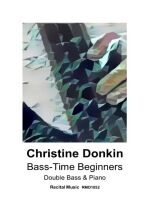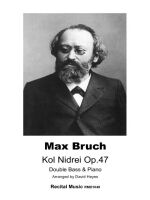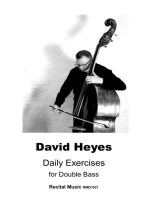The Elephant

Product code:
£6.50
Description
The double bassists’ ‘National Anthem’ arranged for quartet or massed basses. Transposed into D major for ease of performance, Bass 4 has much of the tune, accompanied by the other three basses.
This transcription was made for Bass-Fest ’98, has now been performed around the world, and allows players of all abilities to perform in one magical work. Player and audience-friendly.
Bass 1 will need some facility in the thumb position, and there are some simple and effective harmonic passages, but nothing too taxing. Have fun! In just 52 bars Camille Saint-Saëns has created a minor musical masterpiece. The music is witty and cleverly written to describe the elephant with the introduction of dance music by Berlioz and Mendelssohn adding an extra touch of magic.
This is probably the first piece to introduce the double bass to a general audience and the composer imaginatively uses the lower orchestral register to describe the lumbering beast. In the intervening century since publication, the double bass has seen a revival and renaissance in all aspects of the instrument.
The level of playing is probably the highest it has ever been and our role in the 21st-century is to embrace ‘The Elephant’ – it cannot be unwritten or unpublished – but also demonstrate that the instrument is so much more than simply a musical pachyderm. Can it be a swan? Of course, it can!
Description
The double bassists’ ‘National Anthem’ arranged for quartet or massed basses. Transposed into D major for ease of performance, Bass 4 has much of the tune, accompanied by the other three basses.
This transcription was made for Bass-Fest ’98, has now been performed around the world, and allows players of all abilities to perform in one magical work. Player and audience-friendly.
Bass 1 will need some facility in the thumb position, and there are some simple and effective harmonic passages, but nothing too taxing. Have fun! In just 52 bars Camille Saint-Saëns has created a minor musical masterpiece. The music is witty and cleverly written to describe the elephant with the introduction of dance music by Berlioz and Mendelssohn adding an extra touch of magic.
This is probably the first piece to introduce the double bass to a general audience and the composer imaginatively uses the lower orchestral register to describe the lumbering beast. In the intervening century since publication, the double bass has seen a revival and renaissance in all aspects of the instrument.
The level of playing is probably the highest it has ever been and our role in the 21st-century is to embrace ‘The Elephant’ – it cannot be unwritten or unpublished – but also demonstrate that the instrument is so much more than simply a musical pachyderm. Can it be a swan? Of course, it can!



